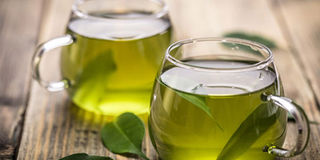Brew profits from herbal teas

Green tea is one of the healthiest beverages laden with antioxidants and nutrients that have powerful effects on the body. NET Photo
What you need to know:
Drinking herbal tea offers you all the plant’s benefits in an easily digestible form. You can therefore cash in on this market as Dorothy Nakaweesi writes.
As more people get to appreciate that health is their wealth, there is a commercial side to it.
Tea, for instance, is a beverage that won’t miss in any household. Most people are accustomed to that cup of tea every day. Apart from warming up your metabolism in the morning, you can kill two birds with one stone by taking a healthy recommended tea.
Green tea is one of the healthiest beverages laden with antioxidants and nutrients that have powerful effects on the body.
Some of these effects include improved brain function and fat loss. Green tea is rich in polyphenols that have effects to lower the risk of cancer and many other impressive benefits.
So then this is where you come in to exploit this opportunity by producing Green tea and other herbal teas such as hibiscus tea.
Mr Newton Buteraba, the chief executive officer -House of Wealth, says: “Lately, Ugandans are adopting a healthy living style to avoid the non-communicable diseases and taking evening tea. This makes a lucrative a niche market to invest in the production of these teas.”
Tea powder is almost used in every household. Green powder tea called matcha is very easy to make and can even be produced at home. The production process involves fermenting fresh tea leaves and drying them.
After drying the fermented tea leaves, they are chopped into small pieces and grinded to a fine powder. Flavours such as lemon, pepper mint, lavender and lemon grass can be added to make it tastier.
Money
Information guide from Uganda Investment Authority’s Compendium of Investment & Business Opportunities for startups shows that basing on the assumption that this is going to be a big project aimed at producing 131,040 kgms of green powdered tea annually.
Production costs assumed are for 312 days per year with daily capacity of producing 1,680-250gms of green tea powder.
To produce this amount of tea, you would require at least (Shs574m). This will earn you at least $220,147 (Shs825m) in the first year of operation.
Direct costs include: materials, supplies and other costs that directly go into producing the product.
This is one business you can start small in the confines of your home using the basic kitchen.
Green tea making machines can be accessed or ordered on Alibaba –an on-line marketing platform.
The price of the machines depending on the size and make range from $200 (Shs750,000) to $500 (Shs1.8m) per each set. If you cannot afford this, experts say the machines can be fabricated at Katwe artisanal hub.
In business
Hudah Nassali Tamale has been making herbal teas – green tea inclusive, as a business since 2016.
She hatched this idea out of passion for making her own home made herbal teas.
“I would share the tea casually with people around me because they love it. When the demand became overwhelming, I put a price to it,” she explains.
Sourcing the herbs from her small backyard garden, Nassali started growing different herbs.
As the demand increased, she bought land and started growing the different herbs and green tea.
She adds: “When I have to make big orders, I make use of out growers who are spread countrywide to supply.”
She sometimes works from home and when she has to supply bigger orders, her production unit in Mpata-Mukono comes in handy.
Annually, Nassali produces teas worth Shs20 million with a monthly turnover of about Shs1.6m.
She says since she juggles this business with consultancy work, it is not fully utilised and hopes to go full capacity because the demand is big.
Market
Mr Buteraba says that green tea powder is not very common on the market. Therefore, when introduced; many people will shift to its consumption.
He says your friends and workmates should be your immediate customers. Then look out for a chain of restaurants and eateries.
“Supplying supermarkets, wholesale and retail shops and selling to individual consumers can be viable though advertisement costs have to be considered as the product is not common on the market to increase the sales,” he shares.



